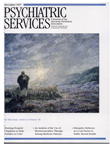The Prevalence of Low Literacy in an Indigent Psychiatric Population
Abstract
Research has shown that individuals with low or limited literacy experience significant obstacles in gaining access to and using health care services. In a study of the prevalence of low literacy in an indigent psychiatric population, 45 patients seeking mental health services at a shelter-based clinic for the homeless were given the Rapid Estimate of Adult Literacy in Medicine screening test. Thirty-four participants (76 percent) read at or below the seventh- to eighth-grade level. Ten patients in this low-literacy group (29 percent) reported that they read "very well," 16 (47 percent) that they read "well," and eight (24 percent) that they read "not well." The results suggest the need for providers to consider formal screening for low literacy in clinical settings.



